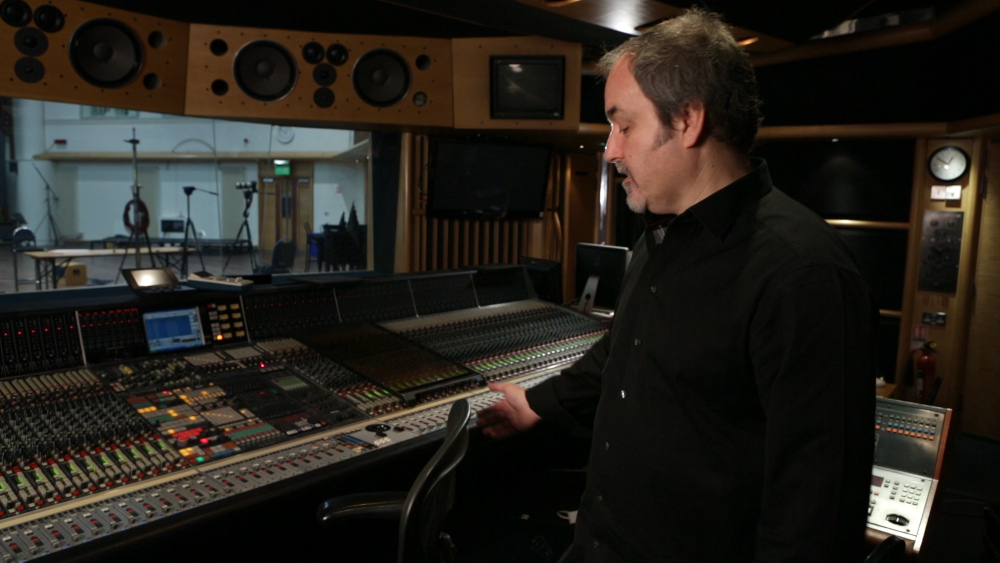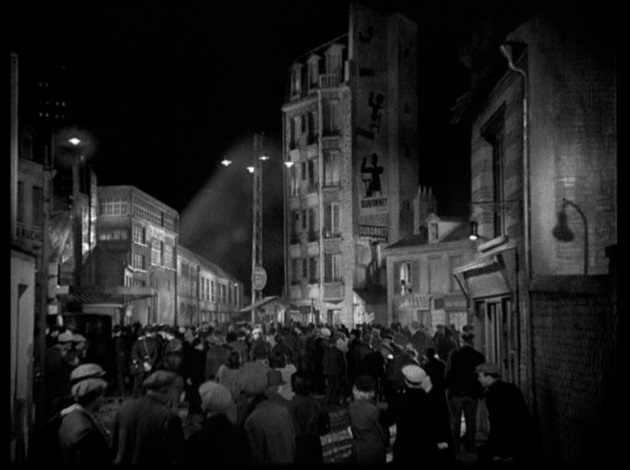The crucial yet almost indefinable role of music in film – it’s a subject ripe for exploration and celebration, from the musicological technicalities of leitmotifs and ostinatos, through to the colourful characters working to bring directors’ sometimes vague musical notions to sonic reality. All of which gets raced through in this jam-packed documentary by first-time director Matt Schrader, a somewhat frenetic, 93-minute dash through the subject.
Schrader has clearly put in a massive amount of work, and Score is very much a labour of love. He’s amassed dozens of interviews, with remarkable access to what seems like every major Hollywood film composer working today, plus directors, film company executives, even Moby and Kalamazoo psychology professor Siu-Lan Tan, offering their expertise on the science and emotional impact of music. Schrader sets out to trace the history of film music – from silent movies to the development of orchestral scores, 1960s experimentalism, 1970s punk and electronica, and the re-emergence of the big orchestral sound. And he intersperses his pithy history lessons with chapters on everything from favourite recording venues to the stress caused by unrealistic deadlines, from wacky instruments to the wonders of electronic sound manipulation.
In true Reithian fashion, there’s plenty here to inform, educate and entertain. But if all that sounds like a lot to digest in just 93 minutes – well, it is. Schrader’s somewhat breathless pace means that many of the areas he tackles hardly get a mention before he’s dashed on to his next subject. A promising exploration of the demands placed on orchestral musicians – who are expected to sightread from scratch for live takes – is curtailed after just a few seconds, for example, while tales of the ghosts of London’s Air Studios from composer David Arnold (pictured below) are disconcertingly allowed far more time. With his mass of interviews, too, Schrader seems determined to be scrupulously fair in giving speakers roughly equal air time – with the unfortunate result that several more minor figures spend quite a bit of time saying not much at all. Okay, he does focus on a handful of major composers for deeper exploration – John Williams, Jerry Goldsmith, Thomas Newman and Hans Zimmer – and Zimmer, in particular, is refreshingly candid in expressing his insecurities over where his next music will even come from. Disney executive Mitchell Lieb, too, seems caught off-guard when revealing that each of the company’s movies costing ‘close to half a billion dollars’ to make, with inevitable financial fallout for everyone involved – not least the composer.
With his mass of interviews, too, Schrader seems determined to be scrupulously fair in giving speakers roughly equal air time – with the unfortunate result that several more minor figures spend quite a bit of time saying not much at all. Okay, he does focus on a handful of major composers for deeper exploration – John Williams, Jerry Goldsmith, Thomas Newman and Hans Zimmer – and Zimmer, in particular, is refreshingly candid in expressing his insecurities over where his next music will even come from. Disney executive Mitchell Lieb, too, seems caught off-guard when revealing that each of the company’s movies costing ‘close to half a billion dollars’ to make, with inevitable financial fallout for everyone involved – not least the composer.
Perhaps understandably, Schrader also remains frustratingly light on the technical details of the music itself. Howard Shore moves towards discussing the leitmotifs that structure his Lord of the Rings scores, and Schrader introduces some clever animated sequences showing how the Tolkein characters’ themes evolve across the trilogy. There’s mention, too, of the ubiquitous ostinatos of Zimmer’s repeating string patterns, and of the subtly innovative textures he generates. But Score could do with a lot more discussion of how composers achieve their effects – and whether successful film music is all about simply going for the most obvious emotional hook.
The film leaves quite a lot of unanswered questions, in fact – how directors even choose their composers, for a start; how composers interpret or adjust their music to suit directors’ demands; and why scores simply get ditched at the last minute (as, according to the movie, they often do). A bigger frustration is that Schrader sticks so unvaryingly to mainstream Hollywood movies, as if that’s all there is – or at least all that matters. What about the music written for Soviet cinema, or Toru Takemitsu’s copious scores for Japanese films? Or, aside from Spielberg and Williams, those director/composer partnerships that develop across several films – Peter Greenaway and Michael Nyman, or Paul Thomas Anderson and Jonny Greenwood?
It’s not that Schrader’s film isn’t well structured. There’s always a clear sense of where you are, and he jumps nimbly from subject to subject in a way that’s always entertaining. It’s just that his focus is so mind-bogglingly broad that it feels like little is covered in sufficient depth, and his relentlessly frenetic pacing makes the film feel – bizarrely – both rushed and overlong. Score is a hugely ambitious undertaking (probably far too ambitious, in fact) and it’s never less than stimulating and rewarding. But there’s little chance of coming away from it with much more of an awareness of how and why a movie’s music affects you. It seems like it’s aimed at an audience who both love film music and know very little about it – which, given the obsessive dedication many film music fans display, is rather an unlikely combination.
Overleaf: watch the trailer for Score

 With his mass of interviews, too, Schrader seems determined to be scrupulously fair in giving speakers roughly equal air time – with the unfortunate result that several more minor figures spend quite a bit of time saying not much at all. Okay, he does focus on a handful of major composers for deeper exploration – John Williams, Jerry Goldsmith, Thomas Newman and Hans Zimmer – and Zimmer, in particular, is refreshingly candid in expressing his insecurities over where his next music will even come from. Disney executive Mitchell Lieb, too, seems caught off-guard when revealing that each of the company’s movies costing ‘close to half a billion dollars’ to make, with inevitable financial fallout for everyone involved – not least the composer.
With his mass of interviews, too, Schrader seems determined to be scrupulously fair in giving speakers roughly equal air time – with the unfortunate result that several more minor figures spend quite a bit of time saying not much at all. Okay, he does focus on a handful of major composers for deeper exploration – John Williams, Jerry Goldsmith, Thomas Newman and Hans Zimmer – and Zimmer, in particular, is refreshingly candid in expressing his insecurities over where his next music will even come from. Disney executive Mitchell Lieb, too, seems caught off-guard when revealing that each of the company’s movies costing ‘close to half a billion dollars’ to make, with inevitable financial fallout for everyone involved – not least the composer. Stuffed with brilliant sight gags and a witty script by Mark Burton and James Higginson, Park’s ingenious hand-crafted animation shines throughout. The Bronze Agers who sneer at the unsophisticated Stone Agers parallel the CGI aficionados who look down on old-skool stop-frame technique. The traditional Aardman-style plasticine pinched thick brows and googly eyes work brilliantly on the characters evoked here.
Stuffed with brilliant sight gags and a witty script by Mark Burton and James Higginson, Park’s ingenious hand-crafted animation shines throughout. The Bronze Agers who sneer at the unsophisticated Stone Agers parallel the CGI aficionados who look down on old-skool stop-frame technique. The traditional Aardman-style plasticine pinched thick brows and googly eyes work brilliantly on the characters evoked here. The recurrent figure in Tavernier’s pantheon is Jean Gabin, the French acting icon from the 1930s through to the early 1960s, much more subtle than Depardieu in his depiction of the ordinary Frenchman. As Tavernier demonstrates with many carefully chosen clips, enhanced by an always eye-opening and thought-provoking commentary, Gabin was as fine an actor as any, not just the personification of a nation’s better self.
The recurrent figure in Tavernier’s pantheon is Jean Gabin, the French acting icon from the 1930s through to the early 1960s, much more subtle than Depardieu in his depiction of the ordinary Frenchman. As Tavernier demonstrates with many carefully chosen clips, enhanced by an always eye-opening and thought-provoking commentary, Gabin was as fine an actor as any, not just the personification of a nation’s better self.